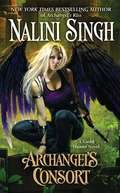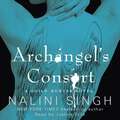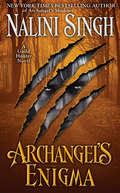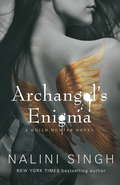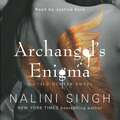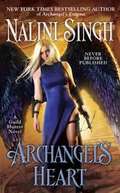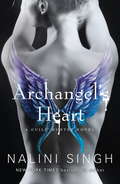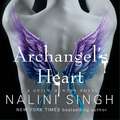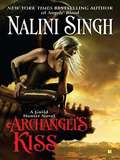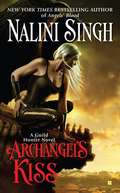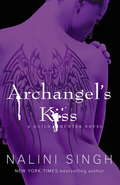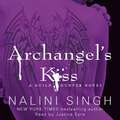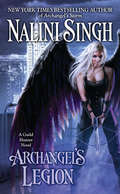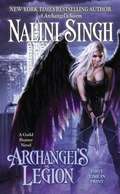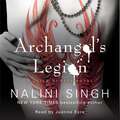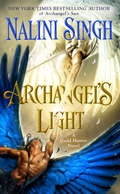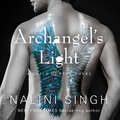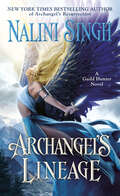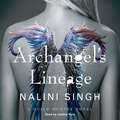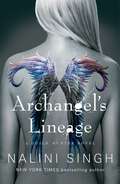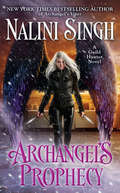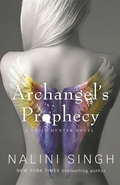- Table View
- List View
Archangel's Consort (Guild Hunter, Book #3)
by Nalini SinghAn ancient and malevolent female immortal is rising in Manhattan to reclaim her son, the archangel Raphael. Only one thing stands in her way: Elena Deveraux, a vampire-hunter and Raphael's lover.
Archangel's Consort: Book 3 (The Guild Hunter Series)
by Nalini SinghNalini Singh steps back into the shadows of her heartbreakingly original world where angels rule, vampires serve, and the innocent can pay the greatest price of all...Vampire hunter Elena Deveraux and her lover, the lethally beautiful archangel Raphael, have returned home to New York only to face an uncompromising new evil...A vampire has attacked a girls'school - the assault one of sheer, vicious madness - and it is only the first act. Rampant bloodlust takes vampire after vampire, threatening to make the streets run with blood. Then Raphael himself begins to show signs of an uncontrolled rage, as inexplicable storms darken the city skyline and the earth itself shudders. The omens are suddenly terrifyingly clear. An ancient and malevolent immortal is rising. The violent winds whisper her name: Caliane. She has returned to reclaim her son, Raphael. Only one thing stands in her way: Elena, the consort who must be destroyed...Read by Justine Eyre(p) 2011 Tantor, Inc
Archangel's Enigma
by Nalini SinghNEVER BEFORE PUBLISHED New York Times bestselling author Nalini Singh returns to her world of dark passion and immortal power--and to one of the most seductive and impenetrable heroes ever to stalk the Guild Hunter landscape... "Oh, Naasir. So weird, so bloodthirsty, so unique and wonderful...I have fallen for him..."--Fiction VixenNaasir is the most feral of the powerful group of vampires and angels known as the Seven, his loyalty pledged to the Archangel Raphael. When rumors surface of a plot to murder the former Archangel of Persia, now lost in the Sleep of the Ancients, Naasir is dispatched to find him. For only he possesses the tracking skills required--those more common to predatory animals than to man. Enlisted to accompany Naasir, Andromeda, a young angelic scholar with dangerous secrets is fascinated by his nature--at once playful and brilliant, sensual and brutal. As they race to find the Sleeping archangel before it's too late, Naasir will force her to question all she knows...and tempt her to walk into the magnificent, feral darkness of his world. But first they must survive an enemy vicious enough to shatter the greatest taboo of the angelic race and plunge the world into a screaming nightmare... Praise for the Guild Hunter novels "One of my favorite paranormal worlds."--Smexy Books "Amazing in every way!"--Gena Showalter, New York Times bestselling author
Archangel's Enigma: Book 8 (The Guild Hunter Series)
by Nalini SinghNaasir is the most feral of the powerful group of vampires and angels known as the Seven, his loyalty pledged to the Archangel Raphael. When rumors surface of a plot to murder the former Archangel of Persia, now lost in the Sleep of the Ancients, Naasir is dispatched to find him. For only he possesses the tracking skills required-those more common to predatory animals than to man.Enlisted to accompany Naasir, Andromeda, a young angelic scholar with dangerous secrets, is fascinated by his nature-at once playful and brilliant, sensual and brutal. As they race to find the Sleeping archangel before it's too late, Naasir will force her to question all she knows . . . and tempt her to walk into the magnificent, feral darkness of his world. But first they must survive an enemy vicious enough to shatter the greatest taboo of the angelic race and plunge the world into a screaming nightmare . . .
Archangel's Enigma: Book 8 (The Guild Hunter Series)
by Nalini SinghNaasir is the most feral of the powerful group of vampires and angels known as the Seven, his loyalty pledged to the Archangel Raphael. When rumors surface of a plot to murder the former Archangel of Persia, now lost in the Sleep of the Ancients, Naasir is dispatched to find him. For only he possesses the tracking skills required-those more common to predatory animals than to man.Enlisted to accompany Naasir, Andromeda, a young angelic scholar with dangerous secrets, is fascinated by his nature-at once playful and brilliant, sensual and brutal. As they race to find the Sleeping archangel before it's too late, Naasir will force her to question all she knows . . . and tempt her to walk into the magnificent, feral darkness of his world. But first they must survive an enemy vicious enough to shatter the greatest taboo of the angelic race and plunge the world into a screaming nightmare . . .Read by Justine Eyre(p) 2015 Tantor Media Inc
Archangel's Heart
by Nalini Singh<P>New York Times bestselling author Nalini Singh takes us into a dangerous and exhilarating world where a deadly, beautiful archangel and his once-mortal consort are caught in a fury of twisted darkness... <P> One of the most vicious archangels in the world has disappeared. No one knows if Lijuan is dead or has chosen to Sleep the long sleep of an immortal. But with her lands falling into chaos under a rising tide of vampiric bloodlust, a mysterious and ancient order of angels known as the Luminata calls the entire Cadre together to discuss the fate of her territory. <P>Accompanying her archangelic lover Raphael to the Luminata compound, guild hunter-turned-angel Elena senses that all is not as it seems. Secrets echo from within the stone walls of the compound, and the deeper Elena goes, the uglier the darkness. <P>But neither Raphael nor Elena is ready for the brutal truths hidden within--truths that will change everything Elena thinks she knows about who she is... <P>Nothing will ever be the same again. <P><b>A New York Times Bestseller</b>
Archangel's Heart: Book 9 (The Guild Hunter Series)
by Nalini SinghOne of the most vicious archangels in the world has disappeared. No one knows if Lijuan is dead or has chosen to Sleep the long sleep of an immortal. But with her lands falling into chaos under a rising tide of vampiric bloodlust, a mysterious and ancient order of angels known as the Luminata calls the entire Cadre together to discuss the fate of her territory. Accompanying her archangel lover Raphael to the Luminata compound, Guild Hunter-turned-angel Elena senses that all is not as it seems. Secrets echo from within the stone walls of the compound, and the deeper Elena goes, the uglier the darkness. But neither Raphael nor Elena is ready for the brutal truths hidden within - truths that will change everything Elena thinks she knows about who she is . . . Nothing will ever be the same again.
Archangel's Heart: Book 9 (The Guild Hunter Series)
by Nalini SinghOne of the most vicious archangels in the world has disappeared. No one knows if Lijuan is dead or has chosen to Sleep the long sleep of an immortal. But with her lands falling into chaos under a rising tide of vampiric bloodlust, a mysterious and ancient order of angels known as the Luminata calls the entire Cadre together to discuss the fate of her territory. Accompanying her archangel lover Raphael to the Luminata compound, Guild Hunter-turned-angel Elena senses that all is not as it seems. Secrets echo from within the stone walls of the compound, and the deeper Elena goes, the uglier the darkness. But neither Raphael nor Elena is ready for the brutal truths hidden within - truths that will change everything Elena thinks she knows about who she is . . . Nothing will ever be the same again.(p) 2016 Tantor
Archangel's Kiss
by Nalini SinghView our feature on Nalini Singh's Archangel's Kiss. New York Times bestselling author of Angels' Blood Vampire hunter Elena Deveraux wakes from a year-long coma to find that she has become an angel-and that her lover, the stunningly dangerous archangel Raphael, likes having her under his control. But almost immediately, Raphael must ready Elena for a flight to Beijing, to attend a ball thrown by the archangel Lijuan. Ancient and without conscience, Lijuan's power lies with the dead. And she has organized the most perfect and most vicious of welcomes for Elena...
Archangel's Kiss
by Nalini SinghView our feature on Nalini Singh's Archangel's Kiss.New York Times bestselling author of Angels' Blood Vampire hunter Elena Deveraux wakes from a year-long coma to find that she has become an angel-and that her lover, the stunningly dangerous archangel Raphael, likes having her under his control. But almost immediately, Raphael must ready Elena for a flight to Beijing, to attend a ball thrown by the archangel Lijuan. Ancient and without conscience, Lijuan's power lies with the dead. And she has organized the most perfect and most vicious of welcomes for Elena...
Archangel's Kiss (Guild Hunter, Book #2)
by Nalini SinghThe "New York Times"-bestselling author of "Angels' Blood" returns to her world of angelic rulers, vampiric servants, and the woman who has been thrust into their darkly seductive world.
Archangel's Kiss: Book 2 (The Guild Hunter Series)
by Nalini SinghWelcome to a dark new world where lethal, beautiful archangels hold sway over immortals and mortals both, with the Guild Hunters caught in between, tasked with retrieving those vampires who break their contracts with their angelic masters.Elena Deveraux is a Guild Hunter. She was hired to do the impossible - to hunt down a rogue Archangel - and she suceeded where none had believed she could. But in the process, she fell in love. And not just with anyone: with the Archangel Raphael. It is a love that's as powerful, entrancing and incredible as it is terrifying, and dangerous.But the world won't stand still while Elena and Raphael enjoy their new-found love. Vampires and angels still go rogue, and it's still Elena's job to hunt them down, and return them to their angelic masters. For all that she is exceptional, Elena isn't invulnerable - and the more obvious her talents become, the bigger a target she could find herself ...
Archangel's Kiss: Book 2 (The Guild Hunter Series)
by Nalini SinghWelcome to a dark new world where lethal, beautiful archangels hold sway over immortals and mortals both, with the Guild Hunters caught in between, tasked with retrieving those vampires who break their contracts with their angelic masters.Elena Deveraux is a Guild Hunter. She was hired to do the impossible - to hunt down a rogue Archangel - and she suceeded where none had believed she could. But in the process, she fell in love. And not just with anyone: with the Archangel Raphael. It a love that's as powerful, entrancing and incredible as it is terrifying, and dangerous.But the world won't stand still while Elena and Raphael enjoy their new-found love. Vampires and angels still go rogue, and it's still Elena's job to hunt them down, and return them to their angelic masters. For all that she is exceptional, Elena isn't invulnerable - and the more obvious her talents become, the bigger a target she could fins herself...Read by Justine Eyre(p) 2010 Tantor, Inc
Archangel's Legion
by Nalini SinghNalini Singh, the New York Times bestselling alpha author of paranormal romance (Booklist) returns to an immortal world of violent passion and lethal power on the brink of a deadly archangelic war. Angels are falling from the sky in New York, struck down by a vicious, unknown force. Vampires are dying impossibly of disease. Guild hunter Elena Deveraux and the Archangel Raphael must discover the source of the wave of death before it engulfs their city and their people, leaving New York a ruin and Raphael¿s Tower under siege by enemy archangels. Yet even as they fight desperately to save the city, an even darker force is stirring, its chill eyes trained on New York and on Raphael. Rivers of crimson and nightmares given flesh, the world will never again be the same.
Archangel's Legion
by Nalini SinghFIRST TIME IN PRINTNalini Singh, the New York Times bestselling "alpha author of paranormal romance" (Booklist) returns to an immortal world of violent passion and lethal power...on the brink of a deadly archangelic war.Angels are falling from the sky in New York, struck down by a vicious, unknown force.Vampires are dying impossibly of disease.Guild hunter Elena Deveraux and the Archangel Raphael must discover the source of the wave of death before it engulfs their city and their people, leaving New York a ruin and Raphael's Tower under siege by enemy archangels.Yet even as they fight desperately to save the city, an even darker force is stirring, its chill eyes trained on New York...and on Raphael. Rivers of crimson and nightmares given flesh, the world will never again be the same...
Archangel's Legion (Guild Hunter)
by Nalini SinghNalini Singh, the New York Times bestselling “alpha author of paranormal romance” (Booklist) returns to an immortal world of violent passion and lethal power…on the brink of a deadly archangelic war. Angels are falling from the sky in New York, struck down by a vicious, unknown force. Vampires are dying impossibly of disease. Guild hunter Elena Deveraux and the Archangel Raphael must discover the source of the wave of death before it engulfs their city and their people, leaving New York a ruin and Raphael’s Tower under siege by enemy archangels. Yet even as they fight desperately to save the city, an even darker force is stirring, its chill eyes trained on New York…and on Raphael. Rivers of crimson and nightmares given flesh, the world will never again be the same…
Archangel's Legion: Book 6 (The Guild Hunter Series)
by Nalini SinghNalini Singh, the NEW YORK TIMES bestselling 'alpha author of paranormal romance' (BOOKLIST), returns to an immortal world of violent passion and lethal power ... on the brink of a deadly archangelic war.Angels are falling from the sky in New York, struck down by a vicious, unknown force.Vampires are dying impossibly of disease.Guild hunter Elena Deveraux and the Archangel Raphael must discover the source of the wave of death before it engulfs their city and their people, leaving New York a ruin and Raphael's Tower under siege by enemy archangels.Yet even as they fight desperately to save the city, an even darker force is stirring, its chill eyes trained on New York ... and on Raphael. Rivers of crimson and nightmares given flesh, the world will never again be the same...Read by Justine Eyre(p) 2013 Tantor Media Inc
Archangel's Light (A Guild Hunter Novel #14)
by Nalini SinghNalini Singh returns to the world of the Guild Hunters for the most highly anticipated novel of the beloved series—a love story so epic it&’s been half a millennia in the making… Illium and Aodhan. Aodhan and Illium. For centuries they&’ve been inseparable: the best of friends, closer than brothers, companions of the heart. But that was before—before darkness befell Aodhan and shattered him, body, mind, and soul. Now, at long last, Aodhan is healing, but his new-found strength and independence may come at a devastating cost—his relationship with Illium. As they serve side by side in China, a territory yet marked by the evil of its former archangel, the secret it holds nightmarish beyond imagining, things come to an explosive decision point. Illium and Aodhan must either walk away from the relationship that has defined them—or step forward into a future that promises a bond infinitely precious in the life of an immortal…but that demands a terrifying vulnerability from two badly bruised hearts.
Archangel's Light (The Guild Hunter Series)
by Nalini SinghReturn to the hauntingly beautiful world of archangels in New York Times bestselling author Nalini Singh's captivating Guild Hunter series.Illium and Aodhan. Aodhan and Illium. For centuries they've been inseparable: the best of friends, closer than brothers, companions of the heart. But that was before-before darkness befell Aodhan and shattered him, body, mind, and soul. Now, at long last, Aodhan is healing, but his new-found strength and independence may come at a devastating cost-his relationship with Illium.As they serve side by side in China, a territory yet marked by the evil of its former archangel, the secret it holds nightmarish beyond imagining, things come to an explosive decision point. Illium and Aodhan must either walk away from the relationship that has defined them-or step forward into a future that promises a bond infinitely precious in the life of an immortal . . . but that demands a terrifying vulnerability from two badly bruised hearts.
Archangel's Light (The Guild Hunter Series)
by Nalini SinghIllium and Aodhan. Aodhan and Illium. For centuries they've been inseparable: the best of friends, closer than brothers, companions of the heart. But that was before-before darkness befell Aodhan and shattered him, body, mind, and soul. Now, at long last, Aodhan is healing, but his new-found strength and independence may come at a devastating cost-his relationship with Illium.As they serve side by side in China, a territory yet marked by the evil of its former archangel, the secret it holds nightmarish beyond imagining, things come to an explosive decision point. Illium and Aodhan must either walk away from the relationship that has defined them-or step forward into a future that promises a bond infinitely precious in the life of an immortal . . . but that demands a terrifying vulnerability from two badly bruised hearts.
Archangel's Lineage (A Guild Hunter Novel #16)
by Nalini SinghNew York Times bestselling author Nalini Singh&’s dangerous and beautiful world of archangels, vampires, and mortals has never faced a threat this cataclysmic… Raphael and Elena are experiencing their first ever year of true peace. No war. No horrors of archangelic power. No nightmares given flesh. Until…the earth beneath the Refuge begins to tremble, endangering not only angelkind&’s precious and fragile young, but the very place that has held their most innocent safe for eons. Amid the chaos, Elena&’s father suffers a violent heart attack that threatens to extinguish their last chance to heal the bonds between them and make sense of the ruins of their agonizing shared history. Even as Elena battles grief, Raphael is torn from her side by the sudden disappearance of an archangel. But worse yet is to come. An Ancestor, an angel unlike any other, stirs from his Sleep to warn the Cadre of a darkness so terrible that it causes empires to fall and civilizations to vanish.This time, even the Cadre itself may not be able to stop a ticking clock that is counting down at frightening speed…
Archangel's Lineage (The Guild Hunter Series)
by Nalini SinghRaphael and Elena are experiencing their first ever year of true peace. No war. No horrors of archangelic power. No nightmares given flesh. Until...the earth beneath the Refuge begins to tremble, endangering not only angelkind's precious and fragile young, but the very place that has held their most innocent safe for eons. Amid the chaos, Elena's father suffers a violent heart attack that threatens to extinguish their last chance to heal the bonds between them and make sense of the ruins of their agonizing shared history. Even as Elena battles grief, Raphael is torn from her side by the sudden disappearance of an archangel. But worse yet is to come. An Ancestor, an angel unlike any other, stirs from his Sleep to warn the Cadre of a darkness so terrible that it causes empires to fall and civilizations to vanish.This time, even the Cadre itself may not be able to stop a ticking clock that is counting down at frightening speed...
Archangel's Lineage (The Guild Hunter Series)
by Nalini SinghRaphael and Elena are experiencing their first ever year of true peace. No war. No horrors of archangelic power. No nightmares given flesh. Until...the earth beneath the Refuge begins to tremble, endangering not only angelkind's precious and fragile young, but the very place that has held their most innocent safe for eons. Amid the chaos, Elena's father suffers a violent heart attack that threatens to extinguish their last chance to heal the bonds between them and make sense of the ruins of their agonizing shared history. Even as Elena battles grief, Raphael is torn from her side by the sudden disappearance of an archangel. But worse yet is to come. An Ancestor, an angel unlike any other, stirs from his Sleep to warn the Cadre of a darkness so terrible that it causes empires to fall and civilizations to vanish.This time, even the Cadre itself may not be able to stop a ticking clock that is counting down at frightening speed...
Archangel's Prophecy (A Guild Hunter Novel #11)
by Nalini SinghReturn to New York Times bestselling author Nalini Singh’s darkly passionate Guild Hunter world, where human-turned-angel Elena Deveraux, consort to Archangel Raphael, is thrust center stage into an eons-old prophecy…Midnight and dawn, Elena’s wings are unique among angelkind—and now they are failing. The first mortal to be turned into an immortal in angelic memory, she’s regressing. Becoming more and more human. Easier to hurt. Easier to kill. <P><P>Elena and Raphael must unearth the reason for the regression before Elena falls out of the sky. Yet even as they fight a furious battle for Elena’s very survival, violent forces are gathering across the world. In China, the Archangel Favashi is showing the first signs of madness. <P><P> In New York, a mysterious sinkhole filled with lava swallows a man whole. In Africa, torrential monsoon rains flood rolling deserts. And in Elena’s mind whispers a haunting voice that isn’t her own. This time, survival may not be possible…not even for the consort of an archangel. <P><b>A New York Times Bestseller</b>
Archangel's Prophecy: Guild Hunter Book 11 (The Guild Hunter Series)
by Nalini SinghMidnight and dawn, Elena's wings are unique among angelkind . . . and now they're failing. The first mortal to be turned into an immortal in angelic memory, she's regressing. Becoming more and more human. Easier to hurt. Easier to kill.Elena and Raphael must unearth the reason for the regression before it's too late, and Elena falls out of the sky. Yet even as they fight a furious battle for Elena's very survival, violent forces are gathering in New York and across the world.In China, the Archangel Favashi is showing the first signs of madness. In New York, a mysterious sinkhole filled with lava swallows a man whole. In Africa, torrential monsoon rains flood rolling deserts. And in Elena's mind whispers a haunting voice that isn't her own.This time, survival may not be possible . . . not even for the consort of an archangel.Read by Justine Eyre(p) Tantor Media 2018
